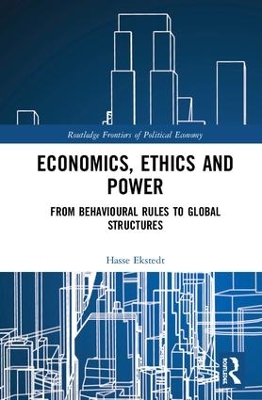Routledge Frontiers of Political Economy
1 primary work • 2 total works
Book 131
This book is a discourse on modelling Man in a social context. Its focus is on economic main-stream theory in its capacity to handle basic problems such as uncertainty, social dynamics and ethics. The point of departure is a systematic critique of the specific methodology of economics and its axiomatic structure. The ultimate aim is to develop an economic theory for a socially sustainable society.
Economic Theory and Social Change analyses the foundation of economic market theory in relation to its social implications. On rejecting the axiomatic structure of the market theory Hasse Ekstedt and Angelo Fusari analyse the concept of growth and uncertainty with respect to a more realistic modelling of man, The book also addresses central political problems and their potential solutions, including permanent unemployment, distribution of income, the interaction of real and financial growth, money and the credit system.
In seeking objective values to help to obtain a socially sustainable society, the book traces a tentative revision of economic and social thought based on a deepening of some crucial features of modern economies and societies. These features include innovation, the connected flows of uncertainty, entrepreneurship, and their role in fuelling and characterizing economic growth and development. This book will be of interest to postgraduate students and researchers of Economics, particularly to those focussing on Economic Theory and Political Economy.
Economic theory in its neoclassical form is sometimes regarded as free from values; it is simply the theory of economic exchange. This can only hold true if we accept the idea of "Homo Economicus" and the equilibrium economy. But in the real world, away from neoclassical models, there is no intrinsic stability as such. Instead, stability is created by the surrounding social, cultural and political structures. Clearly, it is imperative that ethics features in the analysis of these economic and socio-political structures.
Drawing on Aristotle, Kant, Hume and others, this book conceptualizes the analysis of ethics and economic and social structures. It first considers the key philosophical underpinnings and categories which frame the discussion of ethics in economic theory and then considers individual ethics, social action, financial structures and war. Throughout, ethics are examined in a multicultural context with structural complexities, and the difficulties in finding a coherent set of ethics which provides social cohesion and an open society are considered. A key part of this is the comparison of two ethical principles which can be adopted by societies: ius soli or loyalty to constitution, and ius sanguinis or loyalty to "Blood and Soil". The latter is argued to lead to problems of Us and the Other.
Introducing the possibility of integrating microscopic ethics into socio-political structures and proposing the eventual existence of a global ethics, this volume is a significant contribution to the emerging literature on economics, social structures and ethics. It will be of particular interest to those working in business and public administration and who have an education in socio-economic areas, but it also has a broad appeal to students and academics in the social sciences.

